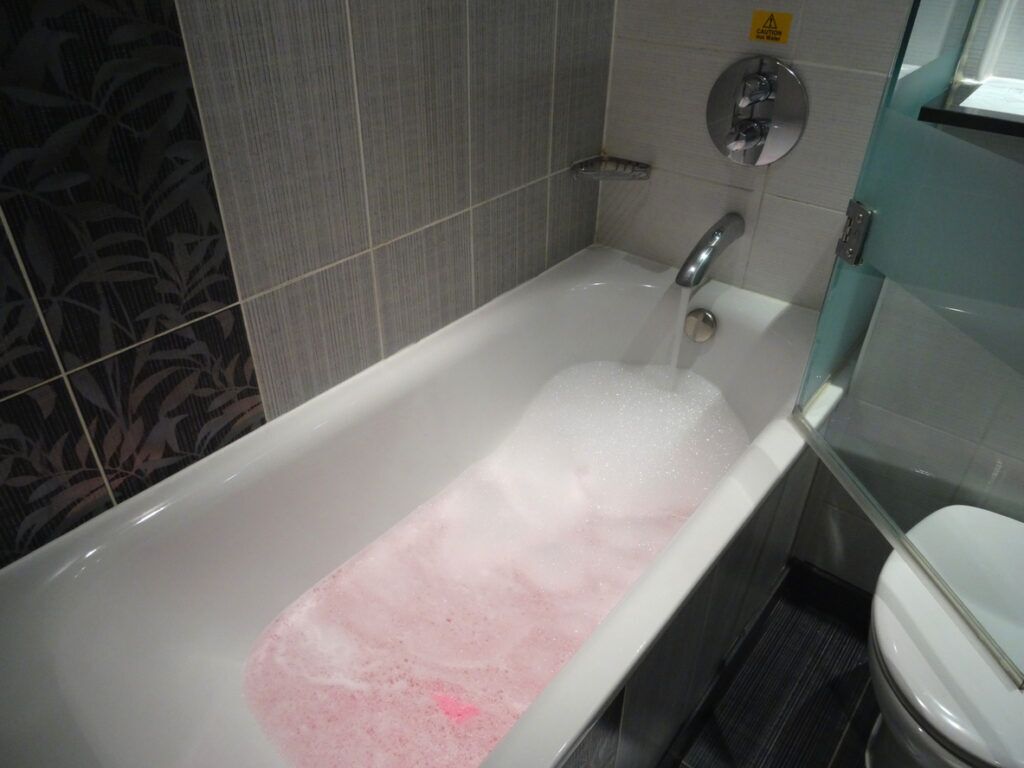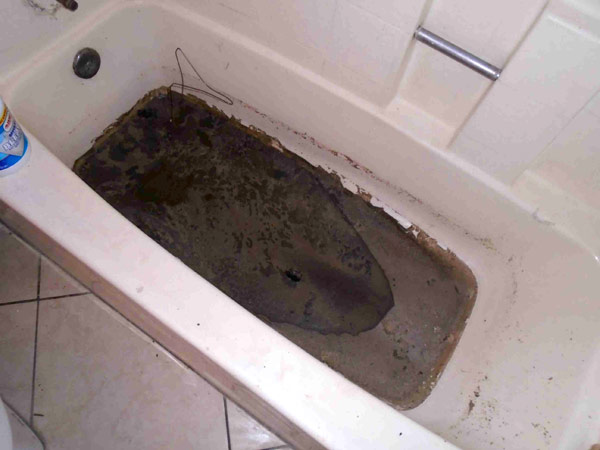Important Explanations for Effluent in the Bathtub
Important Explanations for Effluent in the Bathtub
Blog Article
On this page further down you can locate a lot of professional facts all about Why is There Sewage Coming Up Through the Bathtub.

Sewer back-up in the tub can be an upsetting and unsanitary problem for any house owner. Not only is it troublesome, but it likewise positions severe health threats and shows underlying concerns with the plumbing system. Recognizing why sewage is showing up via the bath tub is essential for taking ideal activity to address the trouble properly.
Introduction to the Issue
Comprehending the Issue
When sewage starts backing up right into the bathtub, it's a clear indicator of a trouble with the water drainage system. The wastewater that must be flowing away from your home is instead locating its back right into your living space, which can bring about significant damage and carcinogen.
Possible Causes
A number of aspects can contribute to sewer back-up in the bathtub. From obstructions in the sewer line to concerns with the plumbing facilities, determining the origin is essential for finding a service.
Typical Factors for Sewer Back-up
Clogs in the Drain Line
One of the most usual sources of sewer backup is an obstruction in the sewage system line. This can occur as a result of the buildup of debris, oil, or international objects in the pipelines, protecting against appropriate circulation and causing sewage to support into your tub.
Tree Origin Breach
Tree origins seeking moisture and nutrients can infiltrate sewage system lines via small splits or joints. In time, these origins can expand and broaden, causing considerable damages to the pipes and causing sewage backup concerns.
Aging Infrastructure
Older homes might have outdated plumbing systems that are a lot more prone to rust, cracks, and damage. As pipelines age, they become much more prone to leaks and blockages, enhancing the chance of sewage backup incidents.
Heavy Rainfall or Flooding
Throughout periods of heavy rainfall or flooding, the drain system might become overloaded with excess water, triggering back-ups and overflows. This can cause sewer backing up right into tubs and various other components inside the home.
Wellness Risks Connected With Sewage Backup
Contamination of Water Supply
Sewage back-up can pollute the water supply in your home, positioning a significant wellness danger to you and your family members. Direct exposure to polluted water can cause gastrointestinal issues, skin infections, and various other diseases.
Spread of Condition
Sewer has dangerous bacteria, infections, and bloodsuckers that can trigger a series of conditions, including liver disease, cholera, and gastroenteritis. Entering contact with sewer or infected surfaces puts you in jeopardy of infection.
Mold Growth
Wetness from sewer back-up can produce excellent problems for mold and mildew growth in your house. Mold and mildew spores can worsen breathing troubles and cause allergic reactions in sensitive people, making prompt cleaning necessary.
Signs of Sewage Backup
Foul Odors
Undesirable smells rising from drains pipes or fixtures, particularly in the shower room, might indicate sewage backup problems. These smells are commonly strong and consistent, indicating a trouble that needs instant attention.
Slow Draining Fixtures
Bath tubs, sinks, and bathrooms that drain slowly or not at all could be experiencing sewer back-up. If numerous components are affected all at once, it's most likely that the problem originates from an usual factor, such as the major drain line.
Gurgling Sounds
Odd gurgling or gurgling noises coming from drains pipes when water is running elsewhere in the house are a sign of air trapped in the plumbing system. This air accumulation can result from sewer backup and should be explored immediately.
Immediate Actions to Take
Switching Off Water
In case of sewer back-up, it's important to turn off the supply of water to prevent additional contamination and damage. Find the major water shutoff valve in your house and closed it off till the issue can be dealt with.
Speaking To a Professional Plumber
Taking care of sewer back-up is not a DIY work. Call a qualified plumber with experience in taking care of sewage-related issues to evaluate the scenario and do required repair work or cleanings.
Preventing Contact with Infected Water
Till the sewage backup is fixed, stay clear of contact with infected water to avoid the spread of germs and microorganisms. Use safety equipment if you must remain in the affected area and clean your hands thoroughly afterward.
Safety nets
Regular Upkeep of Sewer Lines
Set up regular inspections and upkeep of your drain lines to recognize and address prospective issues prior to they rise right into significant problems. This can consist of clearing out particles, inspecting for tree root breach, and fixing any damaged pipelines.
Setting Up Bayou Shutoffs
Think about installing backwater shutoffs in your plumbing system to prevent sewage from flowing back into your home throughout periods of heavy rainfall or flooding. These shutoffs automatically close when water draws back up, protecting your property from contamination.
Appropriate Disposal of Home Waste
Stay clear of flushing anything other than toilet paper and human waste down the toilet to prevent blockages and clogs in the drain line. Dispose of grease, oil, and other family chemicals correctly to decrease the threat of plumbing troubles.
Tidying up After Sewage Backup
Sanitation Procedures
Extensively sanitize and sanitize affected locations after sewage back-up to eliminate harmful germs and avoid mold and mildew development. Use proper cleaning items and safety equipment to guarantee risk-free and effective clean-up.
Remediation of Influenced Areas
Fix any damage to flooring, walls, or fixtures brought on by sewer backup. Depending upon the level of the damages, you may need to replace carpeting, drywall, or other products to recover your home to its pre-loss problem.
Why is There Sewage Coming Up Through the Bathtub
Sewage in your bathtub is a major problem that can make you want to abandon the bathroom for good. You don’t have to. However, it is important to identify the source of the issue and take the necessary steps to resolve it in order to avoid any health risks and property damage. In this article, we will discuss what could be causing sewage to back up through your bathtub so you can take action quickly and effectively.
The Main Reason For Sewage Backup in The Bathtub
All the sinks and toilets in your home connect to different pipes that lead to the main sewer line. The sewer line then connects to the municipal sewer system. This connection works seamlessly on a daily basis, but there can sometimes be a problem with the main sewer line.
The most common cause of sewage backup is a clogged or blocked main sewer line. The main sewer line can be clogged due to the accumulation of debris, tree roots or grease buildup, or other materials. Another possible cause is a collapsed pipe. When this happens, your toilets and sinks won’t be able to drain properly. This is when sewage starts backing up through the bathtub. If the problem has been occurring for some time now, it might be time to consult with a plumber as there may be more severe damage that needs fixing.
How Can You Tell if it’s Coming From Your Sewer Line?
If you’re experiencing a sewage backup in your bathtub, then you can use a few simple methods to determine if it is coming from the main sewer line. First, try to unclog the tub drain with a plunger or an auger and see if that helps. If not, then inspect all of the drains in your house and check if there is any blockage in them. If some of the other drains are not working fine, then it’s likely the problem is with your main sewer line.
Common Signs of a Clogged Main Sewer Line
If you suspect that your main sewer line is blocked, then there are a few common signs to look out for. Frequent clogs in your home are a sure sign of a clogged sewer line. You can also check for slow drainage from all the plumbing fixtures.
Slow Drains
If you notice that it takes longer for your sinks and toilets to drain, then this could be a sign of a clogged main sewer line.
Frequent Clogs
Another common sign is that your drains or toilets become clogged almost all of the time. If this happens, then it could be a sign that the main sewer line is blocked.
Water Backup
Do you notice water or sewage coming back up from any of the drains in your home? If your answer is yes, you may have a clogged main sewer line.
Sinkholes
If you’ve noticed sinkholes in your yard or overflowing sewage from the ground, you may be facing a blocked sewer line issue.
Your Shower or Sink Makes Gurgling Noises
Have you noticed gurgling noises coming from your sink or shower lately? These are typically signs of a blocked sewer line and should be checked out immediately.
How to Prevent a Main Sewer Line Clog
Once you’ve identified that your main sewer line is clogged, it’s important to take steps to prevent it from happening again. The best way to do this is to avoid putting any solid material that can clog the drain, such as grease and other debris. You should also be mindful of what you flush down your toilet. In addition, you should schedule regular maintenance for your main sewer line. This will help keep it clear and free from clogs or backups.
What Should You do if You Notice Sewage Backing up Through The Bathtub?
If you’ve noticed sewage backing up through the bathtub, then it is important to call a professional plumber immediately. A plumber can inspect the situation and determine what the cause is, such as a blocked main sewer line. They will also be able to advise you on how best to fix the issue. In some cases, a simple drain cleaning may be all that is needed.
However, if the blockage is severe, then your plumber may need to use more advanced methods to clear the blockage.
No matter what, it is important to always call a professional plumber if you experience any kind of sewage backup. They will be able to assess the situation and provide you with a solution that is best for your home.
https://baylorinc.com/blog/why-is-there-sewage-coming-up-through-the-bathtub/

As a serious reader about What To Do If Sewage Starts Backing Up Into the Shower, I think sharing that piece of content was really helpful. If you please take the opportunity to distribute this blog post if you liked it. Thank you for taking the time to read it.
Check Us Out
Report this page